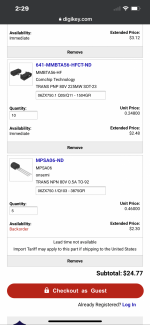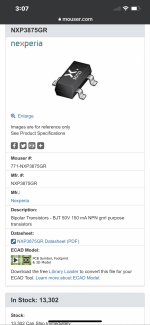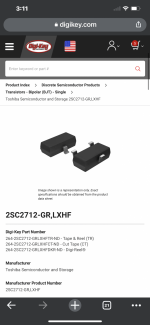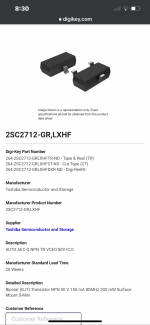Looking for an equal or better substitute/replacement to repair my Kicker 06ZX750.1 monoblock amp.
Q05 & Q11: 1504GR sub?
Q103: 3875GR sub?
digikey doesn’t carry either and mouser only carries the 3875GR but don’t want to pay $10 for just a few transistors ...but I will if I have to, it’s only $10. It trying to limit the sites in ordering from, but ya any direction would help, going to search the forums now, maybe should have before posting this but it seems to be a common question so maybe a direct thread to it wouldn’t be a bad idea? 😅
P.S. as of right now this is what I came across for subs but is there better? And the bottom one/3875GR sub looks nothing like the stock
Q05 & Q11: 1504GR sub?
Q103: 3875GR sub?
digikey doesn’t carry either and mouser only carries the 3875GR but don’t want to pay $10 for just a few transistors ...but I will if I have to, it’s only $10. It trying to limit the sites in ordering from, but ya any direction would help, going to search the forums now, maybe should have before posting this but it seems to be a common question so maybe a direct thread to it wouldn’t be a bad idea? 😅
P.S. as of right now this is what I came across for subs but is there better? And the bottom one/3875GR sub looks nothing like the stock
Attachments
I’m just going to order the top one in pic from digikey (confirmed via other threads) and this from Mouser ...regardless of costs even tho I only need 1, lol. Quick confirmation they are good for this repair before ordering? Duno why I need it when I’ve been pouring over threads confirming already, lol, but ya ...crash course! Lol
Attachments
The supplier device package is the only difference, s-mini on the above vs to-236AB on the 3875gr but all other specs the exact same, what is this spec? Is it just what it sounds like? It’s what the ship it on so they aint jumbling loose?
Last edited:
Dimensions from what I can tell and vendors all have their own codes, but they are basically the same dimensions as well, H1mm x W1.5mm x L3mm ...tell me I just found a replacement/sub by my darn self ...if so this ain’t as overwhelming as it seems ...kinda sorta lol 😅
For the power supply driver transistors, I used the MMBTA56.
The MMBTA06 may work for the KTC3875GR.
These are good general purpose transistors to keep on hand.
The MMBTA06 may work for the KTC3875GR.
These are good general purpose transistors to keep on hand.
Ok, that’s what PapaZBill recommended as well, my only concern is the MMBTA06 specs don’t look the same, unless I’m confusing something, does the transistor in attached pic look to be a better option spec wise? It came up when I searched for same spec pieces, and it’s almost the same size as well. I’m going to go and compare spec sheets with the 3875GR to triple check
Attachments
I’m such a layman bro I’m prolly confusing something, I tried comparing the data sheets without knowing how to technically read them, that and when I tried searching with DigiKey’s “similar item search function” with their check boxes that came up. But I’m gona stop overthinking with my layman’s knowledge and trust the professional 🙂 ty, finally think I have everything I need to start this repair! I’ll be making up a more in depth thread on its own soon with everything I’ve accumulated on the repair in the hopes of learning more and to maybe help others as well. Ty 🖖🏼
For low-speed or basic on/off switching, the substitute has to be able to withstand equal or greater voltage and current. For use in the power supply of a car amp, these may be all that you need to look at.
For higher frequency circuits like those in a class D output stage, the speed of the transistor also comes into play. A transistor that's too slow may not switch cleanly enough or may run hot enough to fail.
For some non-switching audio output stages (class AB...), you have to look at voltage and current and sometimes the speed of the transistor also comes into play. If you use a transistor that's too fast, it can sometimes make the circuit unstable (tendency to oscillate, not good). You sometimes have to test thoroughly to confirm that a substitute is working as it should.
This mainly applies to the smaller transistors in a circuit. For output transistors, especially in switching amplifiers, it's sometimes difficult to get a working sub without extensive testing.
For higher frequency circuits like those in a class D output stage, the speed of the transistor also comes into play. A transistor that's too slow may not switch cleanly enough or may run hot enough to fail.
For some non-switching audio output stages (class AB...), you have to look at voltage and current and sometimes the speed of the transistor also comes into play. If you use a transistor that's too fast, it can sometimes make the circuit unstable (tendency to oscillate, not good). You sometimes have to test thoroughly to confirm that a substitute is working as it should.
This mainly applies to the smaller transistors in a circuit. For output transistors, especially in switching amplifiers, it's sometimes difficult to get a working sub without extensive testing.
Ahh ok, def makes sense to test after installing a substitute, and I was under the layman’s impression that ALL specs needed to match up exactly, good to eee they don’t lol 😅 but also good to know their roles, etc, the explanations help a ton, ty. I’m trying to soak it all up, know how it all works and why, etc, so I def appreciate it Perry, ty 🙂
- Home
- General Interest
- Car Audio
- Bipolar Transistor substitutes/replacements?



